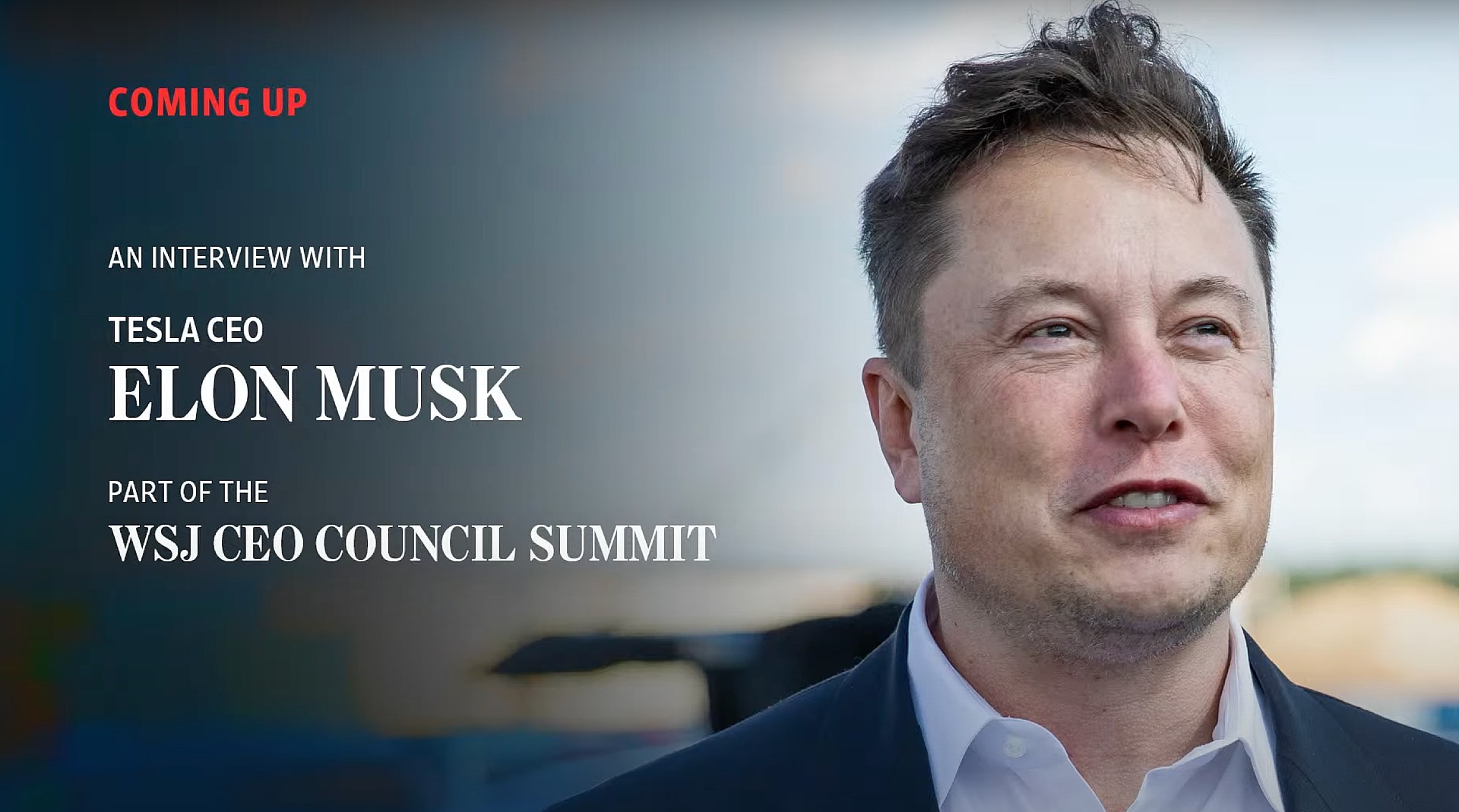
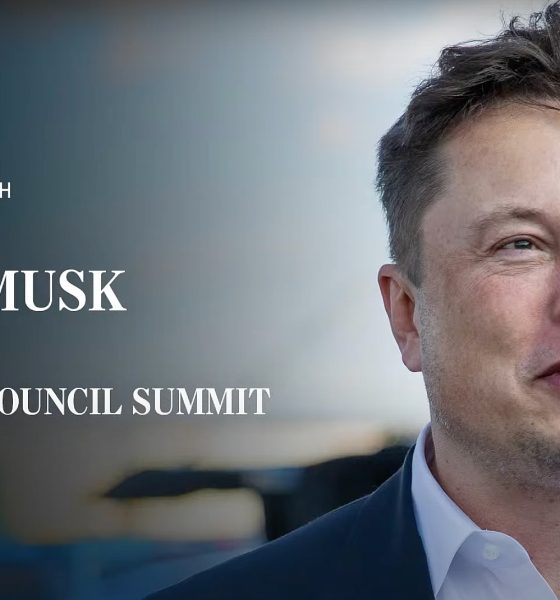
News
Elon Musk speaks up on EV subsidies and government spending: “Don’t pass it.”
Elon Musk spoke in an interview with the Wall Street Journal at the publication’s CEO Council Summit recently. At the summit, Musk covered many topics related to the companies he heads, including Tesla, SpaceX, and Neuralink. He also shared his opinions about the US government’s latest EV subsidy policy and spending habits.
Tesla and EV Subsidies
US President Joe Biden’s Build Back Better Act includes EV subsidies of up to $12,500 per electric vehicle. The US government hopes the tax incentives will encourage consumers to make the EV switch. The bill has passed in the US House of Representatives and is now under deliberation in the Senate.
Tesla could benefit from EV subsidies distributed by the Build Back Better Act as a car company that solely manufactures electric vehicles. Tesla hasn’t relied on tax incentives to drive sales in a long time as it became eligible for EV subsidies way back during the Obama administration. Musk probably surprised everyone at the summit when he advocated for zero EV and fossil fuel subsidies.
“It’s worth noting that the (electric) vehicle purchase tax credit, the $7500, Tesla stopped getting that two years ago. Whereas everyone else except for GM gets the $7500 tax credit. So all of our sales this year and last year had nothing to do with the tax credit because we’re no longer eligible because we’ve made so many electric cars. Tesla’s made roughly two-thirds of all the electric cars made in the United States. I’m not sure if most people are aware of that. So Tesla’s made roughly twice as many electric vehicles as everyone else has made. Honestly, I would just can this whole bill. Don’t pass it. That’s my recommendation,” Musk suggested.
Government Spending
Instead of subsidies for EVs and the fossil fuel sector, which received $5.9 trillion last year, the Tesla CEO suggested that the US government should optimize its spending habits.
“We spend so much money. The federal budget deficit is insane. You know, it’s like $3 trillion, federal expenditures are $7 trillion, federal revenue is $4 trillion. That’s a $3 trillion difference. If this a company, it will be a $3 trillion loss. I don’t know if we should be adding to that loss. That seems pretty crazy. Something’s gotta give. You can’t just spend $3 trillion more than you own every year and don’t expect something bad to happen. You know, this is not good,” Musk said.
But Musk doesn’t seem to wholly disagree with Biden’s Infrastructure Investment and Jobs Act. He believes that the US government should put funds into specific infrastructure to support the growing number of vehicles on the road and the increase of congestion caused by traffic.
“I think we generally could have better airports, better highways, and I think, especially in cities that are congested, there should be something that can deal with extreme traffic, which I think is a combination of double deckers for highways and building tunnels. But if we don’t do something, we’ll be stuck in traffic forever. And as autonomous vehicles come to the fore… there will be more cars on the road, and the traffic will get much worse. So we really need to do some combination of tunnels, and double deckers on freeways… I don’t see a strong effort in this direction,” he said.
Musk’s venture into tunneling with The Boring Company addresses the traffic congestion seen in many cities. Las Vegas already as a Boring Company Loop system connecting the three halls in its Convention Center and is planning another tunnel system with TBC with stations at popular tourist spots. Fort Lauderdale has also started negotiations with The Boring Company for a potential loop to decrease traffic congestion.
The H.R. 3684 , Infrastructure Investment and Jobs Act was signed into law by President Biden on November 15. “This law makes this the most significant investment in roads and bridges in the past 70 years. It makes the most significant investment in passenger rail in the past 50 years and in public transit ever,” said President Biden during the signing.
The Teslarati team would appreciate hearing from you. If you have any tips, reach out to me at maria@teslarati.com or via Twitter @Writer_01001101.

News
Tesla Robotaxi ride-hailing without a Safety Monitor proves to be difficult
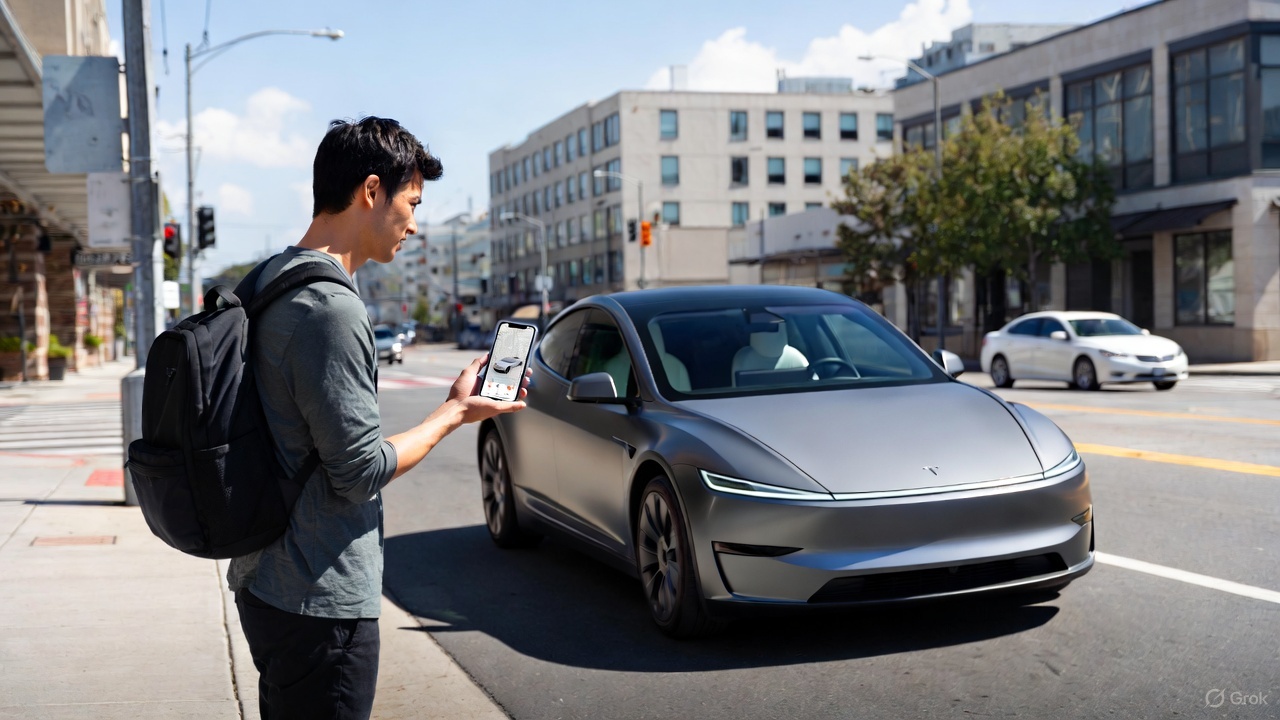
Tesla Robotaxi ride-hailing without a Safety Monitor is proving to be a difficult task, according to some riders who made the journey to Austin to attempt to ride in one of its vehicles that has zero supervision.
Last week, Tesla officially removed Safety Monitors from some — not all — of its Robotaxi vehicles in Austin, Texas, answering skeptics who said the vehicles still needed supervision to operate safely and efficiently.
BREAKING: Tesla launches public Robotaxi rides in Austin with no Safety Monitor
Tesla aimed to remove Safety Monitors before the end of 2025, and it did, but only to company employees. It made the move last week to open the rides to the public, just a couple of weeks late to its original goal, but the accomplishment was impressive, nonetheless.
However, the small number of Robotaxis that are operating without Safety Monitors has proven difficult to hail for a ride. David Moss, who has gained notoriety recently as the person who has traveled over 10,000 miles in his Tesla on Full Self-Driving v14 without any interventions, made it to Austin last week.
He has tried to get a ride in a Safety Monitor-less Robotaxi for the better part of four days, and after 38 attempts, he still has yet to grab one:
Wow just wow!
It’s 8:30PM, 29° out ice storm hailing & Tesla Robotaxi service has turned back on!
Waymo is offline & vast majority of humans are home in the storm
Ride 38 was still supervised but by far most impressive yet pic.twitter.com/1aUnJkcYm8
— David Moss (@DavidMoss) January 25, 2026
Tesla said last week that it was rolling out a controlled test of the Safety Monitor-less Robotaxis. Ashok Elluswamy, who heads the AI program at Tesla, confirmed that the company was “starting with a few unsupervised vehicles mixed in with the broader Robotaxi fleet with Safety Monitors,” and that “the ratio will increase over time.”
This is a good strategy that prioritizes safety and keeps the company’s controlled rollout at the forefront of the Robotaxi rollout.
However, it will be interesting to see how quickly the company can scale these completely monitor-less rides. It has proven to be extremely difficult to get one, but that is understandable considering only a handful of the cars in the entire Austin fleet are operating with no supervision within the vehicle.
News
Tesla gives its biggest hint that Full Self-Driving in Europe is imminent
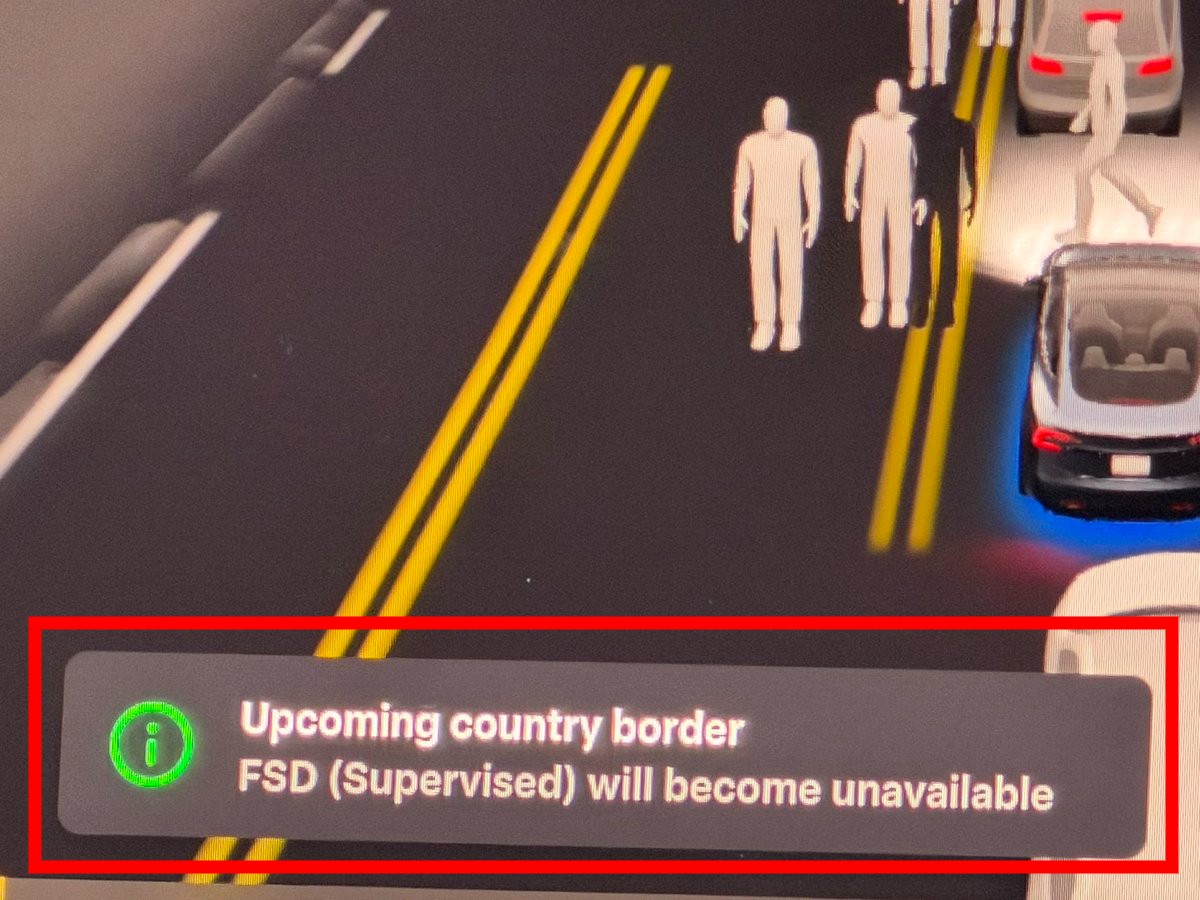
Tesla has given its biggest hint that Full Self-Driving in Europe is imminent, as a new feature seems to show that the company is preparing for frequent border crossings.
Tesla owner and influencer BLKMDL3, also known as Zack, recently took his Tesla to the border of California and Mexico at Tijuana, and at the international crossing, Full Self-Driving showed an interesting message: “Upcoming country border — FSD (Supervised) will become unavailable.”
FSD now shows a new message when approaching an international border crossing.
Stayed engaged the whole way as we crossed the border and worked great in Mexico! pic.twitter.com/bDzyLnyq0g
— Zack (@BLKMDL3) January 26, 2026
Due to regulatory approvals, once a Tesla operating on Full Self-Driving enters a new country, it is required to comply with the laws and regulations that are applicable to that territory. Even if legal, it seems Tesla will shut off FSD temporarily, confirming it is in a location where operation is approved.
This is something that will be extremely important in Europe, as crossing borders there is like crossing states in the U.S.; it’s pretty frequent compared to life in America, Canada, and Mexico.
Tesla has been working to get FSD approved in Europe for several years, and it has been getting close to being able to offer it to owners on the continent. However, it is still working through a lot of the red tape that is necessary for European regulators to approve use of the system on their continent.
This feature seems to be one that would be extremely useful in Europe, considering the fact that crossing borders into other countries is much more frequent than here in the U.S., and would cater to an area where approvals would differ.
Tesla has been testing FSD in Spain, France, England, and other European countries, and plans to continue expanding this effort. European owners have been fighting for a very long time to utilize the functionality, but the red tape has been the biggest bottleneck in the process.
Tesla Europe builds momentum with expanding FSD demos and regional launches
Tesla operates Full Self-Driving in the United States, China, Canada, Mexico, Puerto Rico, Australia, New Zealand, and South Korea.
Elon Musk
SpaceX Starship V3 gets launch date update from Elon Musk
The first flight of Starship Version 3 and its new Raptor V3 engines could happen as early as March.
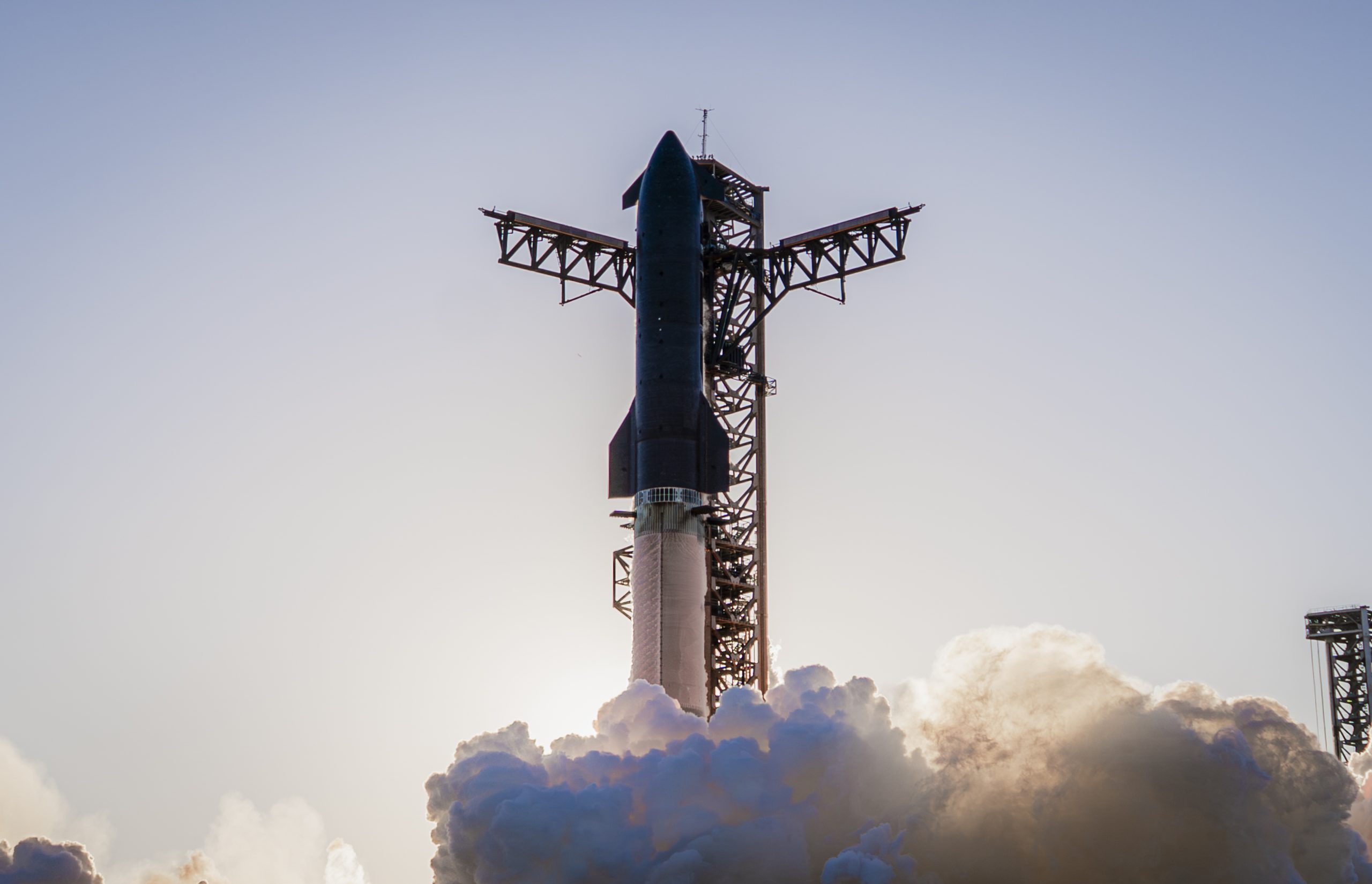
Elon Musk has announced that SpaceX’s next Starship launch, Flight 12, is expected in about six weeks. This suggests that the first flight of Starship Version 3 and its new Raptor V3 engines could happen as early as March.
In a post on X, Elon Musk stated that the next Starship launch is in six weeks. He accompanied his announcement with a photo that seemed to have been taken when Starship’s upper stage was just about to separate from the Super Heavy Booster. Musk did not state whether SpaceX will attempt to catch the Super Heavy Booster during the upcoming flight.
The upcoming flight will mark the debut of Starship V3. The upgraded design includes the new Raptor V3 engine, which is expected to have nearly twice the thrust of the original Raptor 1, at a fraction of the cost and with significantly reduced weight. The Starship V3 platform is also expected to be optimized for manufacturability.
The Starship V3 Flight 12 launch timeline comes as SpaceX pursues an aggressive development cadence for the fully reusable launch system. Previous iterations of Starship have racked up a mixed but notable string of test flights, including multiple integrated flight tests in 2025.
Interestingly enough, SpaceX has teased an aggressive timeframe for Starship V3’s first flight. Way back in late November, SpaceX noted on X that it will be aiming to launch Starship V3’s maiden flight in the first quarter of 2026. This was despite setbacks like a structural anomaly on the first V3 booster during ground testing.
“Starship’s twelfth flight test remains targeted for the first quarter of 2026,” the company wrote in its post on X.








